Important Facts about the Human Body | General Awareness - Bank Exams PDF Download
| Table of contents |

|
| Introduction |

|
| Blood |

|
| Human Brain |

|
| Nervous System |

|
| Heart |

|
| Circulatory System |

|
| Lungs and Respiratory System |

|
| Some Important Facts about the Human Body |

|
| Frequently Asked Questions(FAQs) |

|
Introduction
- The human organism is composed of diverse cells, tissues, organs, and other biological systems that carry out distinct specialized functions essential for sustaining good health.
- An organ is a collective arrangement of multiple types of tissues that cooperate to perform a specific function.
- The study of the human body’s structures and functions is known as human anatomy and physiology.
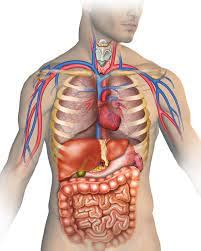 Human Body
Human Body
- The fundamental life processes of the human body encompass:
- Organization
- Metabolism
- Responsiveness
- Movement
- Reproduction
- The human body is a multicellular organism composed of many cells. Every living organism is made up of cells. Some of them are single-celled organisms, including bacteria.
Blood
- Blood is the only fluid connective tissue that plays a major role in the transport of nutrients, respiratory gases, and hormones, in maintaining and regulating body temperature, pH, and other thermo-regulating processes.
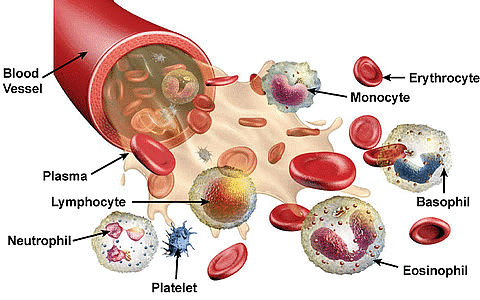 Blood
Blood
- Blood is six times thicker than water, and each drop of blood contains about 250 million cells.
- The adult human body contains a minimum of 1.325 gallons of blood.
- Blood accounts for about 7 to 8 per cent of a person’s total body weight.
Human Brain
- Information moves between neurons in our brain at speeds of up to 250 miles per hour.
- About 75% of the brain is composed of water.
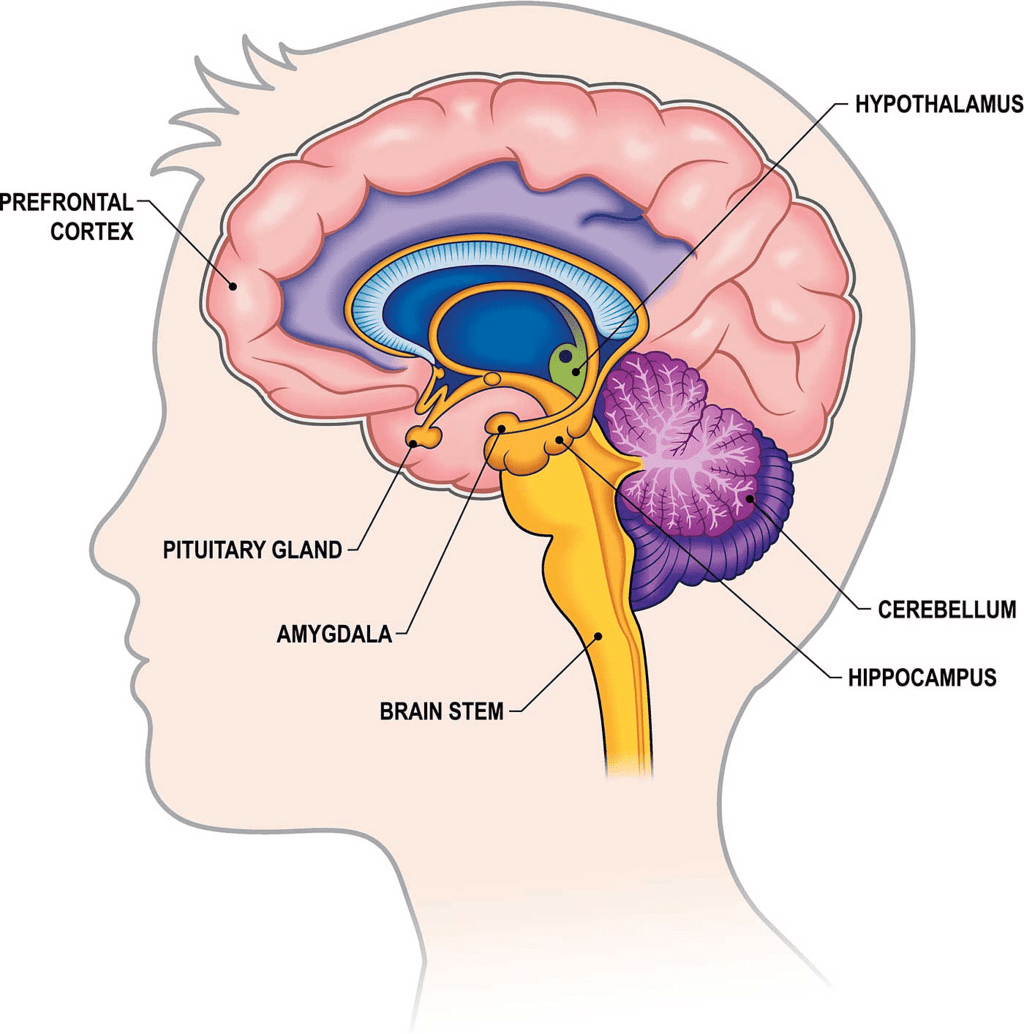 Human Brain
Human Brain
- There are approximately one hundred billion neurons in our brain.
- Cholesterol plays a crucial role in learning and memory.
- The human brain shrinks as we age.
- Stressful events can impact the brain's ability to remember details.
- The brain consumes 20% of the oxygen and blood in your body.
Nervous System
- There are more nerve cells in the human brain than there are stars in the sky.
- The human brain alone contains 100 billion neurons.
- The human spinal cord has about 13,500,000 neurons.
- The brain of a newborn baby grows to three times its size during the first year of life.
- The left side of the human brain is responsible for controlling the right side of the body, while the right side of the brain is responsible for controlling the left side of the body.
- Grey matter is where the processing of sensation, perception, voluntary movement, learning, speech, and cognition takes place. White matter facilitates communication between different grey matter areas and with the rest of the body
- The male brain has 6.5 times more grey matter than the female brain, but a female brain has 10 times more white matter than the male brain.
- Potassium and sodium ions are necessary for the normal functioning of the brain.
- There are 43 pairs of nerves that connect the central nervous system (CNS) to the rest of the body. Twelve nerve pairs are connected to the brain, while the remaining thirty-one are connected to the spinal cord.
Heart
- The average size and dimensions of the heart are as follows: length: 12 cm, width: 8.5 cm, and thickness: 6 cm.
- The average heart weight ranges from 280 to 340 g in males and from 230 to 280 g in females.
- The heart beats approximately 115,000 times a day and pumps about 2,000 gallons of blood per day.
- Women's hearts tend to beat slightly faster compared to men's heartbeats.
- The sound of a heartbeat is produced when the valves of the heart open and close.
- Cancer in the heart is extremely rare due to the fact that heart cells do not divide.
- The first open-heart surgery was performed by Dr. Daniel Hale Williams in 1893.
Circulatory System
- The circulating blood in our body consists of approximately 55% plasma, 40% red blood cells, 4% platelets, and 1% white blood cells.
- Human blood contains atoms of metals, including iron, chromium, manganese, zinc, lead, copper, and small amounts of gold.
- Human blood cells have separate life cycles: on average, red blood cells (RBCs) circulate in the body for about 4 months, platelets for about 9 days, and white blood cells (WBCs) for a few hours to several days.
- The human circulatory system encompasses more than one million miles of blood vessels.
- An adult human body contains an average of 100,000 miles of blood vessels.
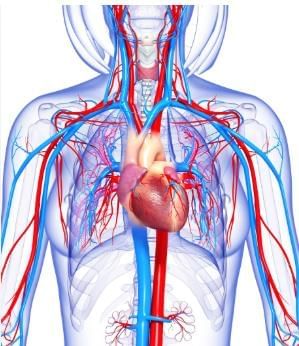
Lungs and Respiratory System
- Pulmonary hypertension is a rare lung disease that causes increased blood pressure in the pulmonary arteries.
- Lungs are the only organ in the human body capable of floating on water.
- Human children and females have higher breathing rates than males.
- Humans release 17.5 ml of water per hour.
- On average, people breathe about 13 pints of air per minute.
- It is possible to live with just one lung.
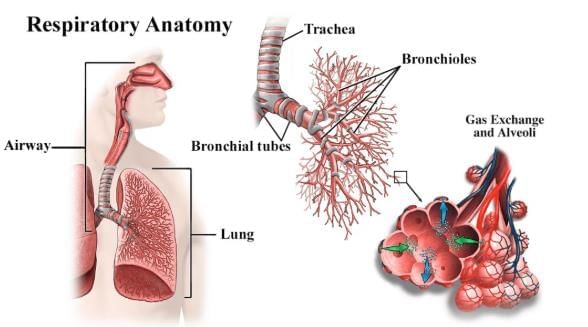
- Approximately 80% of deaths are caused by lung cancer, a result of smoking.
- Peristalsis is a series of wave-like muscle contractions that move food down the oesophagus
- The gut-brain axis is the close bond between the digestive system and the brain.
- The small intestine is about 22–23 feet long, while the large intestine is only around 5 feet long.
- The stomach is made up of flexible muscles and can hold up to 4 pounds of food at a time.
Some Important Facts about Cells
- Cells are the basic, fundamental unit of life.
- So, if we were to break apart an organism to the cellular level, the smallest independent component that we would find would be the cell.
- Each cell contains a fluid called the cytoplasm, which is enclosed by a membrane.
- Also present in the cytoplasm are several biomolecules like proteins, nucleic acids, and lipids.
- Moreover, cellular structures called cell organelles are suspended in the cytoplasm.
Below are some facts about cells:
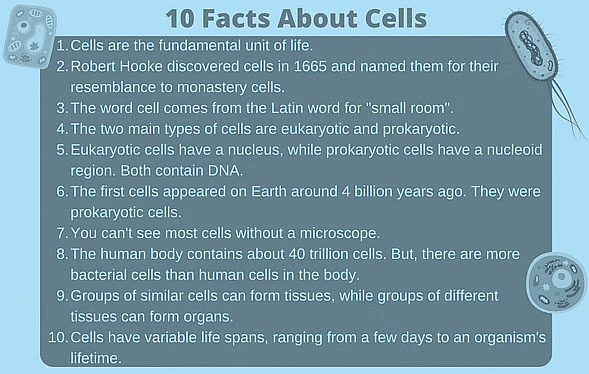
Some Important Facts about the Human Body
Length of Alimentary Canal | Approximately 8 metres |
BMR (Basal Metabolic Rate) | 1600 K. Cal/day |
Number of Cells in the Body | 75 trillion |
Longest Bone | Femur (Thigh bone) |
Smallest Bone | Ear ossicle, stapes (less than 3 millimetres in length and weighing from 2 to 4.3 mg) |
Weight of Brain | 1400 gms |
Blood Volume | 6.8 litres (in 70 kg body) |
Normal B.P | 120/80 mm Hg |
Number of R.B.C | (a) In Male: 4.5-5.0 million/cubic mm. |
Life Span of R.B.C | 120 days |
Normal W.B.C Count | 4000 - 11000/cubic mm |
Life Span of W.B.C | 3 - 4 days |
D.L.C. (Differential Leucocyte Count) | (a) Basophils: 0.5 - 1% |
Blood Platelet Count | 2,00,000 - 4,00,000/cubic mm |
Haemoglobin | (a) In Male: 14 - 15.6 gm/100 c.c. of blood |
Hb Content in the Body | 500 - 700 gm |
Universal Blood Donor | O Rh-ve |
Universal Blood Recipient | AB |
Blood Clotting Time | 2 - 5 minutes |
Average Body Weight | 70 kg |
Normal Body Temperature | 98.4° F or 37°C |
Breathing Rate | 16 - 20/minute |
Dental Formula | Adult: 2123 / 2123 = 32; |
Number of Cranial Nerves | 12 pairs |
Number of Spinal Nerves | 31 pairs |
Largest Endocrine Gland | Thyroid |
Gestation Period | 9 months (253 - 266 days) |
Normal Heart Beat | 72 - 75/minute |
Largest Gland | Liver |
Largest Muscle in the Body | Gluteus maximus (Buttock Muscle) |
Largest Smooth Muscle | The uterus of a Pregnant Woman |
Smallest Muscle in the Body | Stapedius |
Largest Artery | Abdominal Aorta (10 millimetres to 25 millimetres in diameter) |
Largest Vein | Inferior Venacava |
Largest W.B.C | Monocyte |
Smallest W.B.C | Lymphocyte |
Greatest Regeneration Power | In liver |
Longest Nerve | Sciatic |
Longest Cell | Neuron (Nerve Cell) |
Menstrual Cycle | 28 days |
Menopause Age | 45 - 50 Years |
Minimum Regeneration Power | In Brain Cells |
Minimum Distance for proper vision | 25 cm |
Type of Placenta | Haemochorial (Chorioallantoic) |
Pulse Rate | 72/minute |
Volume of Semen | 2 - 4 ml/ejaculation |
Normal Sperm Count | 200 - 350 million/ejaculation |
ESR ( Erythrocyte Sedimentation Rate) | 0–10 mm/hr in men; 0–20 mm/hr in women |
Thinnest Skin | Conjunctiva |
pH of Gastric Juice | 1.4 |
pH of Urine | 6.0 |
pH of Blood | 7.35 - 7.45 |
pH of Bile | 7.5 |
pH of Pancreatic Juice | 8.5 |
Total Number of Muscles in the Body | 639 |
Total Number of Bones in the Body | 206 |
The largest Organ of the Human Body | Skin |
Frequently Asked Questions(FAQs)
Ques1. What are some important facts about the human body?
Ans. Some important facts about the human body include:
- The human body is made up of trillions of cells, which are the basic building blocks of life.
- The human body has 206 bones, which provide structure and support.
- The human brain weighs about 3 pounds and controls all bodily functions.
- The human heart beats around 100,000 times a day and pumps blood throughout the body.
- The human lungs contain over 300 million tiny air sacs called alveoli, where oxygen and carbon dioxide exchange occurs.
Ques2. How many bones are there in the human body?
Ans. There are 206 bones in the human body. These bones provide structure, support, and protection to various organs and systems. They also serve as attachment points for muscles, allowing movement.
Ques3. What is the role of the brain in the human body?
Ans. The brain is the command centre of the human body.
- It controls key bodily functions, including breathing, heart rate, and digestion etc.
- It also enables thinking, memory, emotions, and movement.
- The brain is responsible for processing sensory information from the environment and coordinating the body's response.
Ques4. How does the human heart function?
Ans. The human heart is a muscular organ that pumps blood throughout the body.
- It consists of four chambers - two atria and two ventricles.
- The heart contracts and relaxes in a rhythmic pattern, known as the cardiac cycle, to pump oxygen-rich blood to the body's organs and tissues.
- It receives deoxygenated blood from the body, sends it to the lungs for oxygenation, and then pumps oxygen-rich blood to the rest of the body
Ques5. What is the role of the lungs in the human body?
Ans. The lungs play a vital role in the respiratory system.
- They are responsible for the exchange of oxygen and carbon dioxide.
- When we inhale, the lungs expand and draw in oxygen.
- This oxygen is then transported to the bloodstream and delivered to the body's cells.
- At the same time, the lungs expel carbon dioxide, a waste product of cellular respiration, during exhalation.
|
365 videos|701 docs|149 tests
|
FAQs on Important Facts about the Human Body - General Awareness - Bank Exams
| 1. What is the function of blood in the human body? |  |
| 2. How does the human brain control the body's functions? |  |
| 3. Why is the heart considered the most important organ in the human body? |  |
| 4. How does the respiratory system work to provide oxygen to the body? |  |
| 5. What are some interesting facts about the human body that most people may not know? |  |





















